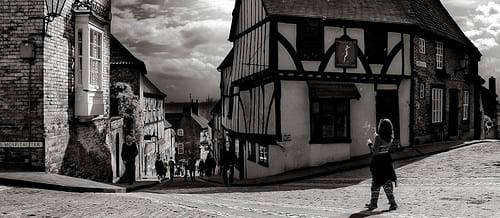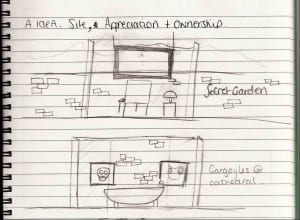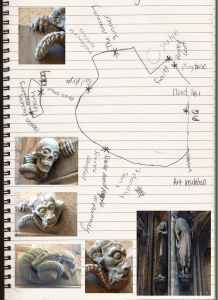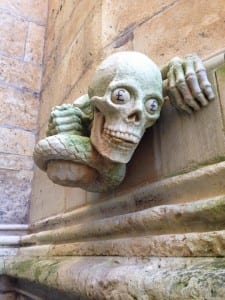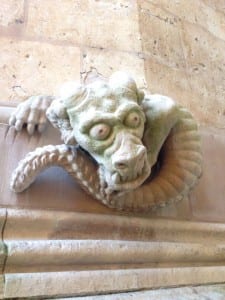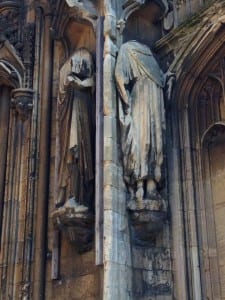During Monday’s lesson the weather was far from perfect. The wind and rain encouraged us to take our research undercover. We knew that we wanted our site to be around the cathedral so we headed into the cathedral to see if we could overhear some conversations about its history or local myths, as our original performance idea involved verbatim. Whist in there we visited the chapter house, of which the architecture blew me away. Whilst gazing into the phenomenal structure of the building a father and his two young children came bombarding in, with booming voices that caught the acoustics brilliantly. The father was telling his children about the history of the building and how it was used for conferences and debates. However the youngest child wasn’t interested at all and continued to run around shouting and seeing if their voice made an echo. This made us think about the difference in perceptions regarding age. What an adult may see in a building (a structure of history), a child may see something very different (a room to make your voice sound big). We then sat and talked more about this idea of seeing things differently and realised that the cathedral has so many layers of perception to it. We really like the idea of perceptions that weren’t overly thought about. Fictional stories that people think of when they immediately see a site or object. This then brought us back to the Gargoyles that we saw. The facts of why they are there are rarely know, thus people create varying myths and stories about their presence. No two stories are the same; therefore the layers begin to appear.
Tag Archives: posts by CRoberts
Podcasts
I found it very hard to put how I felt when listening to these podcasts into words. Therefore I am going to simply list what I scribbled down on my notepad whist listening to them.
Adrian Howells’ podcast: http://www.theguardian.com/culture/audio/2011/nov/21/everyday-moments-podcast-adrian-howells
- Calming
- My breathing ending up following his, therefore it slowed it down and made me quite tired and chilled out.
- When the classical music started playing, it made me fell as if I was in an old fashion black and white movie. Sitting in my small one bed apartment in New York drinking a cup of tea whilst watching the world go by from my window.
- The constant running water (which I presumed was a shower at the time) grounded the piece a little. It was the one constant sound that played all the way through. It because so constant that I forgot it was happening towards the end.
- The chime at the end felt a little odd and out of place. For me it broke the relaxation of the piece, and as I was in bed with a cup of tea I could have easily fallen asleep after the podcast if it wasn’t for the chime. Despite it being a soft and none obtrusive noise, it brought me back to reality a little. Perhaps this was his intention?
Hofesh Shechter’s podcast: http://www.theguardian.com/culture/audio/2011/may/20/everyday-moments-podcast-audio-drama
- This was my personal favorite.
- At first I felt slightly uneasy, his voice sounded so close it felt as if he was standing right behind me.
- The build in music really enhanced the overall experience of the podcast. It followed the emotions you were supposed to feel.
- As the podcast went on his voice became calming, almost reassuring. Therefore when he asked me to feel and imagine these feelings, I did. I ended up trusting his voice.
- Possibly the accent helped.
- The music became very hypnotic, helping me get into that trance-like state. Personally it made me feel like I was in some sort of Si-Fi film.
- The way he phrased what he was saying was incredibly clever. At the beginning it was very general, not personal at all. However when you start to fully immerse yourself into it, he begins to use phrases like ‘no one can see us‘ and ‘we did well’. By the time you reach the end, I honestly felt as if I knew him. Very very clever.
I really enjoyed these site-generic podcasts, especially Hofesh Shechter’s! It has made me really think about what a performance is, and how an audience doesn’t have to be present to make an impact. I was completely taken in by the atmosphere the podcasts created. As an audience member I felt similar emotions to those I would feel if I had visually watched a performance.
Howells, A. (2011) Everyday Moments 11: Audio drama for private performance. [podcast] 21 November. Available from http://www.theguardian.com/culture/audio/2011/nov/21/everyday-moments-podcast-adrian-howells [Accessed 17 February 2015].
Shechter, H. (2011) Everyday Moments 5: Audio drama for private performance. [podcast] 20 May. Available from http://www.theguardian.com/culture/audio/2011/may/20/everyday-moments-podcast-audio-drama [Accessed 17 February 2015].
The power of speech and sight
After reading Tim Etchells’ Certain Fragments the importance of sight was one aspect that stood out for me. We all see things in different ways, that’s the wonders of perception. However, there is a clear difference between seeing something and acknowledging its existence, and seeing something and appreciating its existence. This lack of appreciation for things was always apparent in not only myself but for a lot of people in our class. Within our walk around the city common phrases cropped up such as ‘I never knew this was here’, or ‘I’ve never really looked at this before’. It is common today for the speed of modern life to impact upon how we view our surroundings. Do we really understand and appreciate what’s standing right in front of us? Tim Etchells stated that ‘site is nine-tenths of ownership’ (Etchells, 1999, 78). This phrase really made me think about what it means to own something. To own something literally is to have a connection to it, physically or emotionally. Therefore, to really see something and appreciate it allows for a sense of personal ownership. Thus appreciation of a site is born. Etchells continues to speak about his time in Sheffield, however it immediately made me think of the views from steep hill. ‘To see the city from one’s bed, from one’s bath, from one’s rooftop – how perfect to live in a city, like this one, with hills.’ (ibid, 1999) Etchells may have been talking literally about seeing the city from your house that’s places idyllically on a hill, however it made me think of a way of combining housing and ownership with an appreciation of Lincolnshire sights. Below is a spontaneous drawing of a performance idea that stemmed from both Etchells quotes (my forte is clearly not in art). Recreating living rooms, bathrooms within a small confined cornered off area to create a sense of personal ownership, where photo frames are hung around views and objects that people may have know are there, but never really stopped and appreciated. For example, the view from the roof terrace in the secret garden. I had seen the view before from walking up the hill, but never stopped to appreciate it, this site allowed me to do so. Same with the gargoyles we found, people had seen the cathedral before but never appreciated the smaller detail of it.
Speech can also be a powerful tool in performance. Our group is interested recreating myths and stories about the cathedral through verbatim from local residents. Potentially placing verbatim performances at different areas around the site, creating a misguide. A group I briefly looked into is Look Left Look Right and their site specific performance of The Caravan. It is ‘a half-hour verbatim show edited together from hours of transcribed conversations with people who […] were victims of the floods in 2007.’ (Moran, 2009) I feel that verbatim works well within site specific performances as it allows the audience to experience the surroundings as well as the real emotions of an event or site.
Etchells, T. (1999) Certain Fragments: Contempoary Performance and Forced Entertainment. London: Routledge.
Moran, C. (2009) The Royal Court’s Caravan: a flood victim writes. [blog entry] 19 February. The Guardian. Available from http://www.theguardian.com/stage/theatreblog/2009/feb/19/royal-court-caravan-flood-victim [Accessed 15 February 2015].
Misguides and gargoyles
This weeks tasks had me really engaging with the idea of guides; an idea that I unexpectedly enjoyed. One of the tasks that we were given was to create a map, any type of map, but it had to be unconventional. My partner and I wandered around the cathedral, drawing freehand lines in correspondence to where we walked. We were originally going to recreate the shape of the map with objects we found on our walk. However we were then rapidly distracted when we found controversial gargoyles. This then took us onto a completely different track, and we then started to mark down on the map where the controversial and simply out of place gargoyles were on the cathedral. Within his book Mythogeography, Phil Smith stated that ‘after a while certain things may begin to connect and once that starts happening, without obsessively pursuing a story, you can begin, collectively, to ‘compose’ your drift, allowing what has happened so far to determine your next choices’ (Smith, 2010, 199). This slight tangent that we allowed our drift to go on meant that we developed something that truly interested us, something that was inspired purely from the site itself. I particularly like the idea of a misguide around the cathedral, creating elaborate storied about why and how theses particular statues are here. Allowing people to look beyond the typical tourist view of the cathedral, and discover new information about a place they may have thought they knew so well. Below is the map we drew and some photos of the gargoyles we found on our journey.
As well as experiencing this oddly enlightening drift around the cathedral, we also explored the misguide. Despite finding this exercise difficult at first, it turned out extremely fun and interesting, both as ‘performer’ and audience. Although the facts aren’t true, the audience are shown a new and sometimes outrageous perception of a place. For example there were several misguides that took place, all with brilliant ‘stories’. Each one brought a new perception to the area around where St Paul in the Bail church once stood, and ultimately I’ll now see that place in a completely different light.
Smith, P. (2010) Mythogeography: A Guide to Walking Sideways. Devon: Axminster Triarchy Press.
Oil City by Platform & The Situationists
Whilst researching Site Specific performances I stumbled across a London based group called Platform who use theatre to explore the arts, activism, education and research. They create all types of theatre (site specific, auditorium based etc) that educate the public of current global concerns. Such as foreign energy policies, globalisation’s effect on contemporary corporate behaviour and the current British government oil controversy. I particularly enjoyed their performance ‘Oil City’ (Platform, 2014), which takes the audience ‘deep into the underbelly of London’s oil economy’ (Platform, 2013). They take a small audience of paying guests and immerse them within the scandal by informally guiding them around London’s business quarters. Where ‘by eavesdropping on business people and seeking out secret documents hidden in dead-drops […] [they] will help piece together a puzzle that interweaves government files with financial deals’ (ibid, 2013). Below is a link to their website and the video of their performance:
http://platformlondon.org/p-eventnew/oil-city-site-specific-theatre-by-platform-10th-21st-june-2013/
I feel that this type of promenade theatre and site specific performances go hand in hand, and compliment each other very well. Depending upon the site I choose, promenade theatre would be something I would like to explore more of for the performance. Moreover, the way Platform take the audience on a journey and force them to become involved, not only exposes important economic issues, but also exposes the audience to the idea of general government manipulation. After doing some further digging into site specific performances being used as a tool for public awareness, I stumbled upon The Situationists, who simularly used site specific performances in this way. This Parisian agent-garde group sought to create situations by means of criticising or undermine the capitalist hegemony. For the 1950/60’s their site specific performances raised a lot of public controversy, however they did also raise awareness of British capitalism.
At this moment I am not aware of any site that I believe holds any need for such political dictation in Lincoln (however this may change further on in the process). Although the physical process and the throughout process behind these performances inspire me. Tim Etchelles stated that ‘thats the thing you have to do with a voice after all – make it speak of the things that it cannot deal with – make it speak of the illegal’ (Etchells, 1999, 107). This refers to both voice as a verbal communication and also voice transferred into art. Voice is a very powerful tool, it can entertain, enlighten or educate.
Etchells, T. (1999) Certain Fragments: Contempoary Performance and Forced Entertainment. London: Routledge.
Platform (2013) Oil City – Site Specific theatre by Platform 10th-21st June 2013. [online advertisement] Available from http://platformlondon.org/p-eventnew/oil-city-site-specific-theatre-by-platform-10th-21st-june-2013/ [Accessed 8th February 2015].
Platform (2014) Oil City by Platform. [online video] Available from https://www.youtube.com/watch?v=wwwpaHSg3fw&spfreload=10 [Accessed 8 February 2015].
